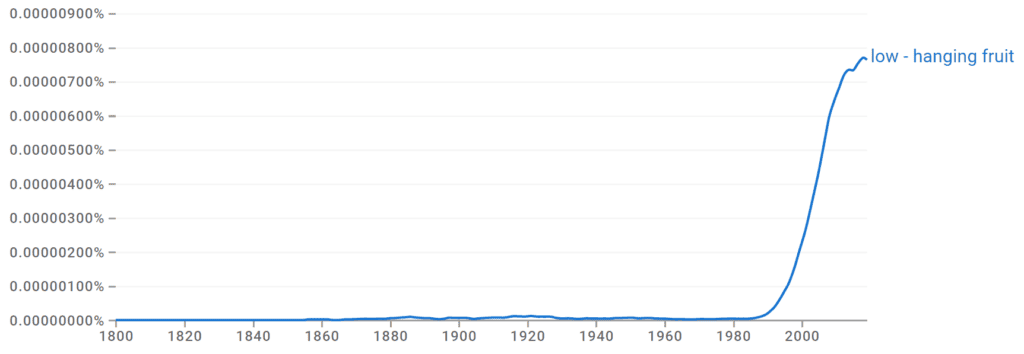Ever heard of low-hanging fruit and wondered if we’re discussing apple picking? I’m afraid this fruit is more metaphorical than literal, but it’s just as juicy to understand. If you plan to use this phrase, you best understand its meaning. So, let’s dive into accessible opportunities and easy targets.
Is It Low Hanging Fruit or Low-Hanging Fruit?
First things first, let’s get the spelling and punctuation right. It’s low-hanging fruit, hyphenated between the word low and hanging because you’re modifying the noun fruit.
The hyphen is essential in this compound adjective as it links the words together to describe whatever person or object is at hand. Remember, in English, we like to keep things tidy and connected when they form one idea, hence the hyphen.
Low-Hanging Fruit Meaning Explained

In its purest form, low-hanging fruit is what we use to describe the most easily achieved of a set of tasks or items. It’s the first step on the staircase, the first mile on a marathon, the first… you get the point. It’s something that can be accomplished with minimal effort or difficulty—kind of like in video games. Sometimes the coins or rewards are just a little too easy to get, making them low-hanging fruit of sorts.
Is the Term Low-Hanging Fruit Positive or Negative?
Now, is low-hanging fruit a compliment or an insult? A blessing or a curse? Well, it’s a bit of both, depending on the context you’re dealing with. If you hear someone referring to a task as low-hanging fruit, it means it’s an easy win that requires minimal effort for maximum payoff.
But referring to a person or idea as low-hanging fruit might imply that they’re the easy or obvious choice but not necessarily the best or most innovative one. Talk about a double-edged sword!
I’m thinking about that scene in “Devil Wears Prada” where the new hire suggests florals for Spring fashion, and the editor rolls her eyes and says, “Florals for Spring? Ground-breaking,” with a heavy dose of sarcasm. She said it because choosing to go with a flower pattern for springtime is an easy pick or the expected choice, aka the low-hanging fruit.
Low-Hanging Fruit Origin and Etymology

Our fruity phrase has its origin story in business and sales jargon. Picture an apple tree with real low-hanging fruit on the branches. The low-hanging fruit is the easiest to pick. It requires the least amount of effort and time. The business world adopted this metaphor to mean the most accessible or easiest targets to achieve, like the easiest sales to close or the most obvious problems to solve.
Low-Hanging Fruit Synonyms
Any of these words and phrases will do just fine in place of this idiom.
- Easy pickings
- Quick wins
- No-brainers
- Easy targets
- Low-risk opportunities
Some Low-Hanging Fruit Examples in a Sentence

- When I started my new diet, I cut out soda. After all, it’s considered low-hanging fruit because it’s an easy change that can have a big impact.
- The low-hanging fruit of productivity is writing lists because you can create a list for anything and cross off items to feel productive.
- Our company first targeted the low-hanging fruit problems, focusing on simple changes that could increase efficiency.
- As a new artist, taking commissions for pet portraits is low-hanging fruit because everyone loves a good picture of their furry best friend.
- Contemporary romance is considered low-hanging fruit in indie publishing because it’s an easy sell.
- For many writers, writing about personal experiences is low-hanging fruit but positive; it requires less research, and the material is easy to access.
Everyone Loves Fruit!
And there you have it! The next time someone mentions low-hanging fruit, you’ll know they’re not inviting you to an orchard to pick actual fruit but talking about the easiest targets or tasks. Just be careful how you use it. You wouldn’t want to imply that someone’s best idea is merely the most obvious one.
Enjoyed reading about this idiom? Check out some others we covered:
